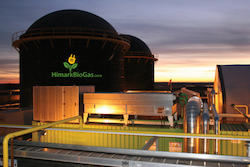Himark BioGas International is building three integrated anaerobic digestion (AD) and fertilizer plants for NEO Energy in Massachusetts and Rhode Island. The AD plants will be designed and constructed by Himark and will recycle food waste to produce renewable electricity and organic-based fertilizer. As part of the agreement, Himark BioGas will act as a technology licensor and owner’s representative on behalf of NEO Energy LLC during the design, construction and operation stages of the plants.
 Shane Chrapko, CEO of Himark BioGas, said, “The development of the anaerobic digestion plants will positively contribute to effective food waste recycling, profitable pathogen-free fertilizer production, energy self-sufficiency and a reduction in carbon emissions for the local communities. Each ton of food waste diverted from the landfill will reduce Greenhouse Gas Emissions by just over one ton of CO2 (Equivalent).”
Shane Chrapko, CEO of Himark BioGas, said, “The development of the anaerobic digestion plants will positively contribute to effective food waste recycling, profitable pathogen-free fertilizer production, energy self-sufficiency and a reduction in carbon emissions for the local communities. Each ton of food waste diverted from the landfill will reduce Greenhouse Gas Emissions by just over one ton of CO2 (Equivalent).”
The AD plants will be designed based on Himark BioGas’ patented “IMUS” technology that can produce renewable energy and pathogen-free fertilizer from food waste, source separated organic materials, cow manure, ethanol plant waste/thin stillage, slaughter house waste, food processing waste and agricultural waste (open pen feedlot, sand-laden dairies, etc.). The IMUS technology also can handle feedstock containing large amounts of sand, dirt, rocks, plastic and cellulose. Furthermore, Himark said with its turnkey, guaranteed-maximum capital cost designs, the company guarantees electricity, gas and fertilizer outputs with any kind of feedstock.
“NEO’s anaerobic digestion plants will recycle food waste generated by supermarkets, food processors, restaurants and other institutions and divert that waste away from landfills and incineration facilities,” said Robert Nicholson, president of NEO Energy. “Our plants produce a high-quality organic-based fertilizer while reducing greenhouse gases, preserving landfill capacity and producing renewable energy. Our first plants will also be available to those businesses that will need to comply with the 2014 commercial food waste disposal ban in Massachusetts and the recently enacted law in Rhode Island requiring that food residuals produced by large waste generators be recycled starting in 2016.

